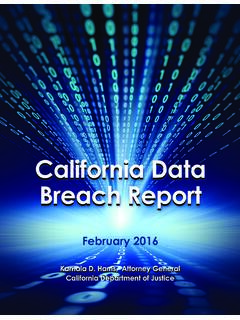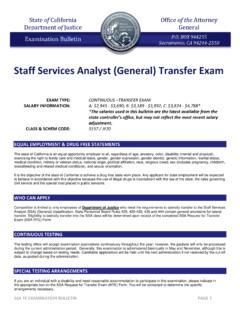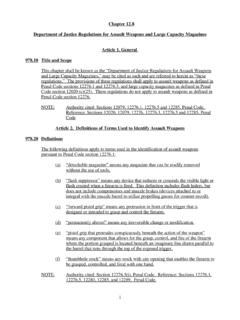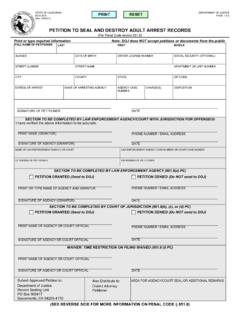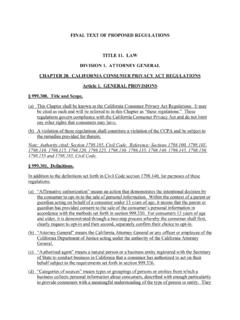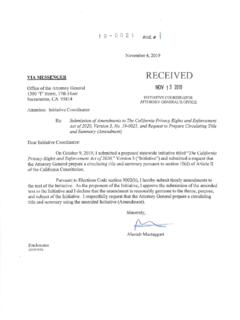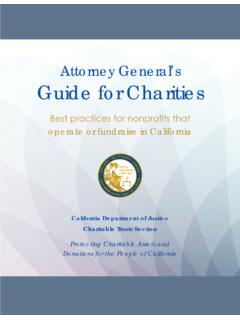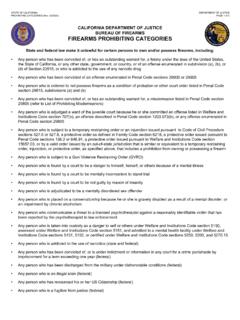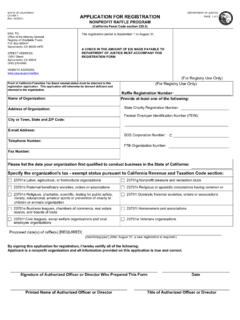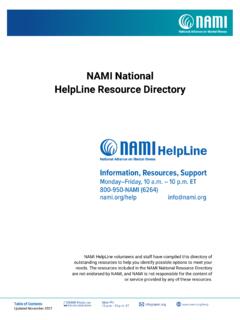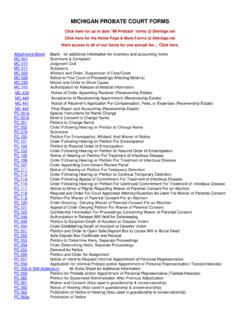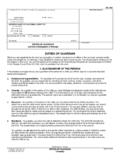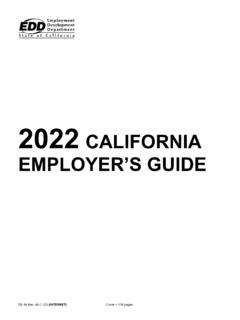Transcription of LEGAL RIGHTS OF PERSONS WITH DISABILITIES
1 With California Department of Justice PersonsPersonsDisabilities LEGAL RIGHTS of DisabilitieswithNovember 2003 LEGAL RIGHTS ofNovember 2003 California Department of Justice Public Inquiry Unit Box 944255 Sacramento, CA 94244-2550 (800) 952-5225 Hearing Impaired: (800) 952-5548 OSP 03 80546 ALEGAL RIGHTS OF PERSONS WITH DISABILITIES " FOURTH EDITION* PREPARED UNDER THE SUPERVISION OF THE CALIFORNIA ATTORNEY GENERAL'S PUBLIC RIGHTS DIVISION civil RIGHTS ENFORCEMENT SECTION BILL LOCKYER Attorney General RICHARD M. FRANK Chief Assistant Attorney General LOUIS VERDUGO, JR Senior Assistant Attorney General SUZANNE M. AMBROSE Supervising Deputy Attorney General KATHLEEN W. MIKKELSON REGINA J. BROWN PHYLLIS W. CHENG GLORIA L. CASTRO ANGELA SIERRA Deputy Attorneys General For additional information about LEGAL RIGHTS OF PERSONS WITH DISABILITIES and for copies, please contact the Attorney General's PUBLIC INQUIRY UNIT, Box 944255, Sacramento, CA 94244-2550 Telephone: (916) 322-3360; Toll free number: (800) 952-5225; Line for the hearing impaired: (916) 324-5564; Toll free number: (800) 952-5548.
2 *Much of the material in this Fourth Edition is an update of the Second and Third Editions, Marian M. Johnston and Kathleen W. Mikkelson, Deputy Attorneys General, writers and editors. TABLE OF CONTENTS Page INTRODUCTION i CHAPTER 1: EMPLOYMENT 1 I. STATE LAW 1 A. Definition of Disability and Medical Condition 1 B. Covered Employers 2 C. Employer Defenses to Discrimination in California 2 D. Employers Must Make Reasonable Accommodations 2 E. Nondiscrimination in Recruitment and Testing 2 F. Complaint Procedures 3 G. Miscellaneous California Employment Discrimination Laws 3 II. FEDERAL LAW 4 A. The Americans With DISABILITIES Act 4 B. The Federal Rehabilitation Act of 1973 6 CHAPTER 2: HOUSING 10 I. HOUSING DISCRIMINATION 10 II. HOUSING PROGRAMS 11 A. Federal Housing Programs 11 B. California Housing Programs 11 CHAPTER 3: NONDISCRIMINATION IN BUSINESS AND SERVICES 13 I. NONDISCRIMINATION IN PUBLIC ACCOMMODATIONS, TRANSPORTATION CARRIERS AND BUSINESS ESTABLISHMENTS 13 A.
3 California Access Law 13 B. Discrimination Based on Disability 14 II. NONDISCRIMINATION IN STATE-SPONSORED PROGRAMS AND ACTIVITIES AND IN PUBLIC PLACES 14 III. NONDISCRIMINATION IN INSURANCE COVERAGE 14 A. Life, Annuity, or Disability Insurance 14 B. Health Insurance 15 C. Automobile Insurance 15 D. Insurance Appeal Procedures 16 IV. NONDISCRIMINATION IN LICENSING AND LICENSED SERVICES 16 TABLE OF CONTENTS Page CHAPTER 4: ACCESS 17 I. ACCESS TO BUILDINGS AND FACILITIES 17 A. Federal Law 17 B. California Law and Regulations 19 II. ACCESS TO POLLING PLACES AND THE VOTING PROCESS - STATE AND FEDERAL ELECTIONS 26 A. State Elections 26 B. Federal Elections 27 III. ACCESS TO TRANSPORTATION 27 A. Driving and Parking 27 B. Mass Transit and Interstate Transportation 29 C. Air Travel 34 IV. ACCESS TO TELECOMMUNICATIONS 36 A. Telephone Systems 36 B. Television Broadcasting 38 CHAPTER 5: EDUCATION 39 I. THE RIGHTS OF CHILDREN WITH DISABILITIES IN PRIMARY AND SECONDARY EDUCATION 39 A.
4 All Children With DISABILITIES Have a Right to a AFree, Appropriate, Public Education@ 39 B. The Law 39 C. A Free, Appropriate, Public Education 40 D. Eligibility & Procedures 43 E. Administrative & Judicial Review 48 II. PRESCHOOL EDUCATION 51 A. Children Younger Than Five May Be Eligible For Special Education Benefits 51 B. Eligible Preschool Children Have the Same RIGHTS as School Age Children 51 III. POST-SECONDARY EDUCATION 52 A. General Law - Section 504 52 B. What is a AProgram or Activity?@ 52 C. Nondiscrimination in Admissions, Recruitment, and Accommodation 52 D. Nondiscrimination in Housing 53 E. Nondiscrimination in Financial Aid 53 F. Nondiscrimination in Nonacademic Services 53 TABLE OF CONTENTS Page CHAPTER 6: PARENTAL RIGHTS 54 I. PARENTAL FITNESS 54 II. CHILD CUSTODY 54 III. ADOPTION 54 CHAPTER 7: PROGRAMS AND SERVICES 55 I.
5 IN HOME SUPPORTIVE SERVICES (IHSS) 55 II. REHABILITATION SERVICES 55 A. Eligibility for Services 55 B. What Vocational Rehabilitation Services Are 55 C. Application Procedures 56 D. The Rehabilitation Appeal Process 56 III. INDEPENDENT LIVING CENTERS 56 IV. REGIONAL CENTERS 57 A. The Regional Center Appeal Procedure 57 V. COMMUNITY MENTAL HEALTH SERVICES 57 CHAPTER 8: BENEFITS 58 I. INCOME BENEFITS 58 A. Social Security Disability Insurance and Supplemental Security Income (SSI) 58 B. State Disability Insurance 60 C. Worker=s Compensation 60 D. Special Needs Allowance for PERSONS With Guide Dogs 61 E. Decreased Energy Rates 61 II. TAX AND BUSINESS BENEFITS 61 A. Tax Benefits 61 B. Business Loans & Enterprises to PERSONS With DISABILITIES 62 CHAPTER 9: HEALTH CARE 63 I. HEALTH CARE BENEFITS 63 A. Medicare 63 B. MediCal 63 C. Hill-Burton Hospitals 64 TABLE OF CONTENTS Page D. California Children=s Services (CCS) 64 E.
6 Genetically Handicapped Person=s Program 64 II. RIGHT TO MEDICAL TREATMENT 65 A. Medical Care for Newborns With DISABILITIES 65 B. Infant Care Review Committees 66 III. RIGHT TO CONSENT TO MEDICAL TREATMENT 66 A. Right of a Conservatee to Refuse Medical Treatment 66 B. Durable Power of Attorney for Health Care 66 C. Limited Right to Die 67 D. Sterilization of PERSONS With DISABILITIES 67 CHAPTER 10: civil RIGHTS OF PERSONS WITH MENTAL AND DEVELOPMENTAL DISABILITIES 68 I. civil RIGHTS OF PERSONS WITH DEVELOPMENTAL DISABILITIES 68 A. Federal and State RIGHTS 68 B. Institutionalization of PERSONS With Developmental DISABILITIES 69 C. RIGHTS of PERSONS With Developmental DISABILITIES in Institutions 69 D. Judicial Hearing to End Institutionalization 70 II. civil RIGHTS OF PERSONS WITH MENTAL DISABILITIES 70 A. The Lanterman-Petris-Short (LPS) Act 70 B. RIGHTS of PERSONS With Mental DISABILITIES 70 C. commitment Procedures 71 D.
7 Certification For Intensive Treatment 72 E. Judicial Hearing 72 F. involuntary Detention Beyond 14 Days 7 3 G. Conservatorship Procedures 73 H. Mental Health Advocacy Programs 73 DIRECTORY OF SERVICES 75 INTRODUCTION California and Federal Law This handbook discusses both California and federal laws that protect the RIGHTS of individuals with DISABILITIES . California and federal law should be examined together to get a complete picture of the law on a particular topic. In some areas California law provides more LEGAL protection or is more comprehensive; in other areas, federal law is more helpful. Statutes, Regulations, and Cases "The law" usually consists of a combination of statutes, regulations, and cases. Statutes are laws passed by legislators either in the state Capitol or in Congress. Statutes are generally fairly short and often do not describe the details of how the law will be enforced or what specifically will constitute a violation of law.
8 Various government agencies are often charged with developing regulations to carry out the mandates of statutes. These regulations usually describe the "nuts and bolts" of a statute's administration. Finally, when cases go to court, judges issue opinions which resolve disputes in interpreting statutes and regulations. An analysis of statutes, regulations, and cases yields the current state of RIGHTS and protections, which change over time as the law changes. What Action Can Individuals Take? Complaints - Many agencies are authorized to allow people who believe they have experienced discrimination or have been denied other RIGHTS to file a complaint. The agency may then investigate the complaint, and if it finds that violations of law have occurred, the agency can impose various sanctions on the violator and award various remedies to the individual who filed the complaint (complainant). Lawsuits - Individuals who experience discrimination or other violations of law can often file a lawsuit in a court.
9 It may be necessary to go through the agency (administrative) complaint process first. Contact the responsible agency as soon as possible to find out when and if you can file a lawsuit. Although you may file a lawsuit by yourself without an attorney, you should probably talk with a LEGAL organization or private attorney if you plan to do so. i CHAPTER 1 EMPLOYMENT This chapter discusses state and federal statutes which promote access to employment opportunities for individuals with DISABILITIES . I. STATE LAW The Fair Employment and Housing Act (FEHA) protects the right of individuals to seek, obtain, and hold employment without discrimination on the basis of physical or mental disability or medical condition. It also prohibits retaliation against a person who has opposed unlawful discriminatory practices under the FEHA or participated in an investigation into unlawful employment practices.
10 (Gov. Code, ' 12940, subd. (h).) The FEHA also prohibits harassment on the basis of a person=s disability. (Gov. Code, ' 12940, subd. (j).) A. Definition of Disability and Medical Condition 1. Disability The definition of "disability" under the FEHA includes both physical and mental DISABILITIES . a. Physical disability Physical disability includes having any physiological disease, disorder, condition, cosmetic disfigurement or anatomical loss, or having a record of such impairment, or being regarding as having or having had such an impairment, that: $ affects one or more body systems (neurological, immunological, musculoskeletal, special sense organs, respiratory, speech organs, cardiovascular, reproductive, digestive, genitourinary, hemic, lymphatic, skin and endocrine); and $ limits a major life activity without regard to mitigating measures, such as medications, assistive devices, prosthetics or reasonable accommodations; or $ any other health impairment that requires special education or related services.
